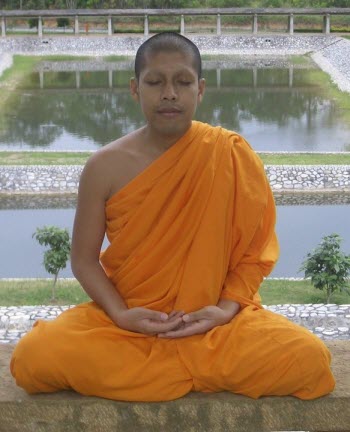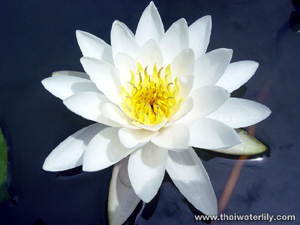Blessing Six:
Setting oneself up properly in life
Setting oneself up properly in life

B. THREE LEVELS OF AIM IN LIFE
1. Exclusively Materialistic Aim In Life: Everybody comes into the world with nothing, but everyone has the same basic needs for survival whether it be the food on their plates, the clothes on their backs, the roof over their head or the medicine they need to keep them healthy in times of illness. If any one of these things are lacking from people’s lives, they cannot survive. Man can only go for a single day without water. He can only go for seven days without food. Thus it is only natural that the very least that people should aim for in their lives is to fulfill these basic physical needs. If their aim in life is any lower that this they cannot survive. Of course some people want more that this. Some people are not satisfied with the basics of survival. They want to be millionaires, they want luxury, and they want the freedom in life to choose what they buy. In fact however much you want, whether it is just to fulfill their physical needs or to satisfy their physical wants, their aim in life is only quite short term. It is based on immediate rewards. They think of no further requirement of life beyond death. In their youth they seek experience, in their middle age they amass wealth. Towards the end of their lives they try to find an heir for their wealth. Thus we call such aims in life "earthly" because they extend no further than this world and this existence. Those who entertain only such an aim in life will usually (but not always — some people cut corners) want to earn their living in an honest way, by earning, saving, using their earnings in a responsible way and entrusting honest people to look after common wealth.
2. Spiritual/Material Aim In Life: At the same time in the world, there are those who recognize that they must fulfill the physical needs of the body, but their aim in life runs deeper than that. They recognize that they need to earn their living, but earning that living is only a means to an end. They recognize that there exists not only a physical hunger, but the hunger of the spirit or the mind too. They realize that if the mind is left hungry it will tempt them to do things they don't want them to do. They need to find time in their lives to reach for a higher spiritual dimension.
3. Exclusively Spiritual Aim In Life: Last of all in the world there are those who realize the hunger of the body and the mind — the body for physical needs and the mind in its hunger for a higher spiritual dimension to life. For such a group of people the sensitivity towards the hunger in the mind is so great that they find that they have the vocation to deal with source of the hunger at its root. So great is the intensity of their calling that they will see the need to devote themselves full time to the pursuit of spirituality. To purify themselves completely so that hunger may be completely extinguished. They have the time to devote to spiritual study without having to compromise their time in order to earn a living. They will spend their time learning the spiritual way and teaching it to the best of their ability so intensively that the life of the householder and the family no longer holds any attraction for them. We call such an aim in life ultimate because is seeks to come to an end of all further suffering and to help others to do the same.
B1. Exclusively Materialistic
Setting yourself up in a proper way for those with an exclusively materialistic aim in life consists of two components:
1. avoiding evil
2. standing on your own two feet
The Buddha’s short teaching of the way to set yourself up in the proper way is probably too short for the reader to know how to practice it so we have to expand a little further on the subject matter
B1.1 Avoiding Evil
Avoiding evil means specifically to avoid the six ‘roads to ruin’ [apāyamukha]. We must avoid them in order to avoid falling into any of the unfortunate realms in future existences. ‘Ruin’ [apāya] here means ‘lowdown’, ‘dirty’, ‘decaying’ and ‘lacking prosperity’. The word ‘road’ [mukha] means ‘path’, ‘front’ or ‘face’. There are six different types of ‘roads to ruin’:
1. Drinking alcohol or taking intoxicating drugs: like opium or heroin;
2. Nightlife: such as frequenting brothels;
3. Frequenting shows: that have content that is romantic or frivolous;
4. Gambling: and lotteries
5. Associating with evil companions
6. Being too lazy to work
B1.1 Avoiding Evil
Avoiding evil means specifically to avoid the six ‘roads to ruin’ [apāyamukha]. We must avoid them in order to avoid falling into any of the unfortunate realms in future existences. ‘Ruin’ [apāya] here means ‘lowdown’, ‘dirty’, ‘decaying’ and ‘lacking prosperity’. The word ‘road’ [mukha] means ‘path’, ‘front’ or ‘face’. There are six different types of ‘roads to ruin’:
1. Drinking alcohol or taking intoxicating drugs: like opium or heroin;
2. Nightlife: such as frequenting brothels;
3. Frequenting shows: that have content that is romantic or frivolous;
4. Gambling: and lotteries
5. Associating with evil companions
6. Being too lazy to work
We will not go into further detail of these roads to ruin’ here. In some places only four ‘roads to ruin’ are referred to instead of six as mentioned already in Blessing One (@E.3) as the sort of thing that fools like to persuade you to do.
B1.2 Standing on you own two feet
In the time of the Buddha, there was someone who asked the way to set himself up in life. The four practices he taught are sometimes called the four chambers of the millionaire’s heart. They are the prerequisite virtues for accruing benefit in the present life (in Pali the diṭṭhadhammikatthapayojana). For revision take a look back at Blessing Two (@C4.1). In conclusion, anyone who is diligent in acquisition of wealth, in stewardship of their earnings, who associates only with good friends and who uses their earnings to support themselves in a modest way will before long achieve riches. All of this hard work will only be of benefit to us in the present lifetime however. If you also want benefits in future lifetime, you need to know how to accrue merit too.
B2. Material/Spiritual Aim
Setting yourself up in a proper way for those with a spiritual/material aim in life consists of three components:
1. avoiding evil
2. standing on your own two feet
3. cultivating virtuous speech and action
Avoiding evil and standing on your own two feet are the same as for those with the exclusively materialistic aim in life. However, on this level we have the addition of virtuous speech and action. This means immersing our mind fully in meritorious speech and action. The way this is achieved is to practice the Ten or the Three Major Ways to Accrue Merit [puññakiriyavatthu] already discussed in Blessing Five (@C2). The guiding principles for accruing merit are the prerequisite virtues to accruing benefit in future lives [sampayikatthapayojana]. For revision take a look back at Blessing Two (@C4.2) and Blessing Four (@B4.6).
B2.1 Warnings about prevarication
On the subject of setting oneself up in life, there are several common misconceptions which you ought to avoid:
1. Don’t wait until you are old before getting spiritual: You should devote yourself to spiritual practice starting from the time when you are still young and healthy. In fact even to start temple-going from the time you are twenty is still too late. If you start temple-going from the age of five or six, like Rāhula in the time of the Buddha, it is your advantage. You should start studying the spiritual side of yourself early in life so that you don’t make grave moral errors. How many of us spend many years drinking alcohol and damaging our minds before we realize what we are doing to ourselves? You can bypass the problem completely if you attend the temple from your youth.
2. Don’t prevaricate about setting yourself up in life: You should work hard to make yourself self-sufficient in life at the earliest possible opportunity — anyone who is still a parasite living in someone else’s house should be quick to make yourself independent.
3. Don’t prevaricate about paying off your debts: Don’t let your debts be something you carry with you to your next life! The interests on loans that span into the afterlife are too high to be worth risking slow repayment. Thus pay off your debts and make sure that you don’t put yourself in debt any more. You should build up your own financial reserves before making an investment, not rely on borrowing from others or from the bank. If you die before you have paid back your loan, next lifetime you will have that debt hanging round your neck like a dead albatross. Suppose you borrow a dollar but die before you can pay it back — supposing you are an angel for a thousand years — just think what the compound interest will add up to during that time! You might never manage to pay it back.
4. Don’t prevaricate about improving on your bad habits: If you know anything about yourself is a bad habit, give up doing it immediately. Check your own behaviour as a regular part of your practice and improve on yourself instead of wasting time finding fault with others.
5. Be careful of bad deeds in the guise of good ones: When you have done a good deed, don’t go wishing for things that are irresponsible.
B3. Exclusively spiritual
Even the Bodhisattva himself needed an aim in life when pursuing perfections in preparation for Buddhahood. Thus it comes as no surprise that on the exclusively spiritual level of aim in life, it is still important to have an aim in life, in order to waste no time in pursuing the goal of purifying the mind to a point where it can enter upon Nirvana. On this level, even material convenience is sacrificed in order fully to cultivate spiritual development.
B3.1 Human Realm as the crossroads of existence
The clearer one’s aim in life, the more clearly one will understand the preciousness of human life — and that we cannot afford to waste a moment. Even if you look around your house, of which you pride yourself as being the owner, if you count the number of fleas, mosquitoes, ants and mice, you will realize that you are in the minority — even though it’s your house! This is intended to give you an inkling of how rare it is to be born human and what a precious opportunity our human lifespan is in forging our destiny. In our human company there are basically four sorts of pathway of human destiny forged during a lifespan (A.ii.85):
B1.2 Standing on you own two feet
In the time of the Buddha, there was someone who asked the way to set himself up in life. The four practices he taught are sometimes called the four chambers of the millionaire’s heart. They are the prerequisite virtues for accruing benefit in the present life (in Pali the diṭṭhadhammikatthapayojana). For revision take a look back at Blessing Two (@C4.1). In conclusion, anyone who is diligent in acquisition of wealth, in stewardship of their earnings, who associates only with good friends and who uses their earnings to support themselves in a modest way will before long achieve riches. All of this hard work will only be of benefit to us in the present lifetime however. If you also want benefits in future lifetime, you need to know how to accrue merit too.
B2. Material/Spiritual Aim
Setting yourself up in a proper way for those with a spiritual/material aim in life consists of three components:
1. avoiding evil
2. standing on your own two feet
3. cultivating virtuous speech and action
Avoiding evil and standing on your own two feet are the same as for those with the exclusively materialistic aim in life. However, on this level we have the addition of virtuous speech and action. This means immersing our mind fully in meritorious speech and action. The way this is achieved is to practice the Ten or the Three Major Ways to Accrue Merit [puññakiriyavatthu] already discussed in Blessing Five (@C2). The guiding principles for accruing merit are the prerequisite virtues to accruing benefit in future lives [sampayikatthapayojana]. For revision take a look back at Blessing Two (@C4.2) and Blessing Four (@B4.6).
B2.1 Warnings about prevarication
On the subject of setting oneself up in life, there are several common misconceptions which you ought to avoid:
1. Don’t wait until you are old before getting spiritual: You should devote yourself to spiritual practice starting from the time when you are still young and healthy. In fact even to start temple-going from the time you are twenty is still too late. If you start temple-going from the age of five or six, like Rāhula in the time of the Buddha, it is your advantage. You should start studying the spiritual side of yourself early in life so that you don’t make grave moral errors. How many of us spend many years drinking alcohol and damaging our minds before we realize what we are doing to ourselves? You can bypass the problem completely if you attend the temple from your youth.
2. Don’t prevaricate about setting yourself up in life: You should work hard to make yourself self-sufficient in life at the earliest possible opportunity — anyone who is still a parasite living in someone else’s house should be quick to make yourself independent.
3. Don’t prevaricate about paying off your debts: Don’t let your debts be something you carry with you to your next life! The interests on loans that span into the afterlife are too high to be worth risking slow repayment. Thus pay off your debts and make sure that you don’t put yourself in debt any more. You should build up your own financial reserves before making an investment, not rely on borrowing from others or from the bank. If you die before you have paid back your loan, next lifetime you will have that debt hanging round your neck like a dead albatross. Suppose you borrow a dollar but die before you can pay it back — supposing you are an angel for a thousand years — just think what the compound interest will add up to during that time! You might never manage to pay it back.
4. Don’t prevaricate about improving on your bad habits: If you know anything about yourself is a bad habit, give up doing it immediately. Check your own behaviour as a regular part of your practice and improve on yourself instead of wasting time finding fault with others.
5. Be careful of bad deeds in the guise of good ones: When you have done a good deed, don’t go wishing for things that are irresponsible.
B3. Exclusively spiritual
Even the Bodhisattva himself needed an aim in life when pursuing perfections in preparation for Buddhahood. Thus it comes as no surprise that on the exclusively spiritual level of aim in life, it is still important to have an aim in life, in order to waste no time in pursuing the goal of purifying the mind to a point where it can enter upon Nirvana. On this level, even material convenience is sacrificed in order fully to cultivate spiritual development.
B3.1 Human Realm as the crossroads of existence
The clearer one’s aim in life, the more clearly one will understand the preciousness of human life — and that we cannot afford to waste a moment. Even if you look around your house, of which you pride yourself as being the owner, if you count the number of fleas, mosquitoes, ants and mice, you will realize that you are in the minority — even though it’s your house! This is intended to give you an inkling of how rare it is to be born human and what a precious opportunity our human lifespan is in forging our destiny. In our human company there are basically four sorts of pathway of human destiny forged during a lifespan (A.ii.85):
1. Out of the darkness into the darkness: Born with all the disadvantages of nature and nurture, they did what came naturally and made a worse mess out of their lives;
2. Out of the darkness into the light: In spite of ample disadvantages of nature and nurture, they struggled against hardship until being able to make some sort of success out of their lives;
3. Out of the light into the darkness: In spite of all the advantages of nature and nurture, they became complacent and made a mess out of their lives.
4. Out of the light into the light: Avoiding the trap of complacency, they built on the advantages of nature and nurture they brought into the world, storing up a yet brighter future for themselves.
The human realm is like a crossroads where destiny can be transformed for the better or for the worse. For sure, transforming one’s destiny for the better means going against the tide. Spiritual cultivation is often hard in the beginning, but pays off in the long-term — something that may not be immediately obvious to someone who sees everything in the short-term. Therefore a proper aim in life is vital for anyone navigating the human crossroads who wants to make a success in forging a brighter destiny.
B3.2 Prerequisites for fulfilling the Highest Aim in Life
In a Buddhist context, fulfillment of Highest Aim in Life, the fruition of all levels of cultivation is to purify the mind completely or to enter upon Nirvana. In order to fulfill this goal six conditions must be fulfilled— without these six prerequisites, all our effort in setting an aim in life will be in vain. These six prerequisites are:
1. You have to have been born in an amenable location i.e. Blessing Four
2. You must have done good deeds until used to them i.e. Blessing Five
4 - 6. The Four Accomplishments already met as catalysts determining the speed with which merit can take its effect as described in Blessing Five
These six factors go together as a set of conditions known as the Six Catalysts or Accomplishments:
1. Catalytic Circumstances [gatisamapati]
2. Catalytic Timing [kālasampatti]
3. Catalytic Location [padesasampatti]
4. Catalytic Family [kulasampatti]
5. Catalytic State of Well-being [upadhisampatti]
6. Catalytic View [diṭṭhisampatti]
If you find that you are hampered in setting yourself up in life in the way you would wish, perhaps you have to consolidate Blessing Four and Blessing Five to contribute sufficient Accomplishments to your spiritual quest to give you the ‘escape velocity’ you need to forge your destiny to the full!










